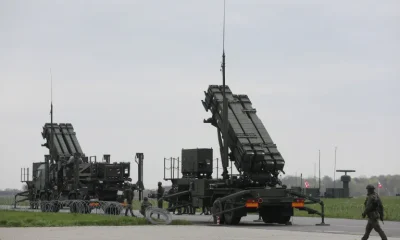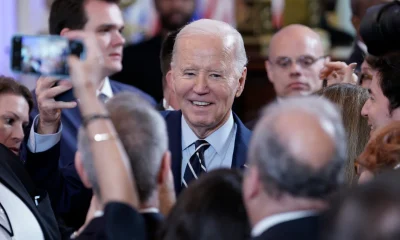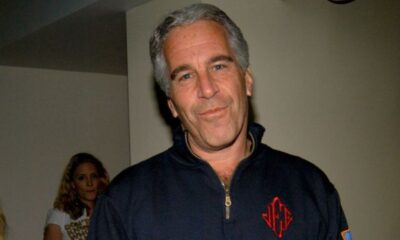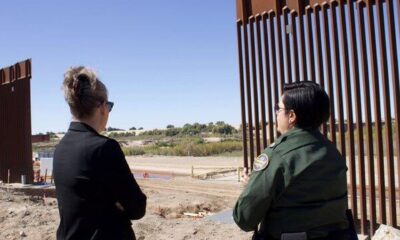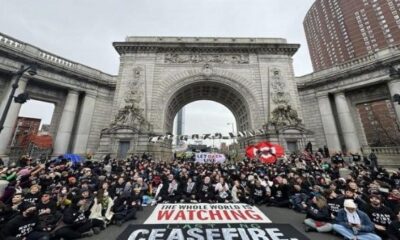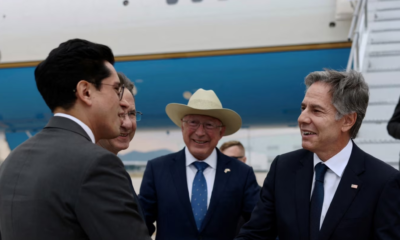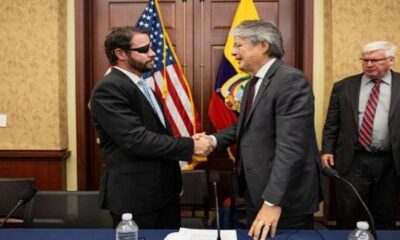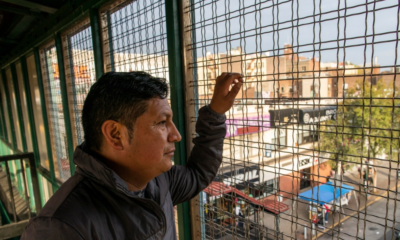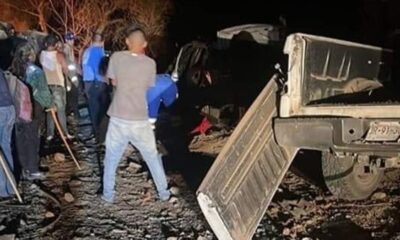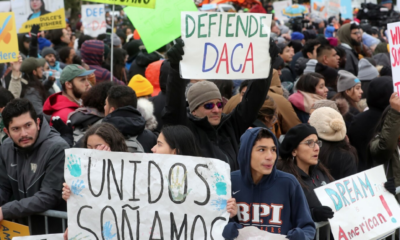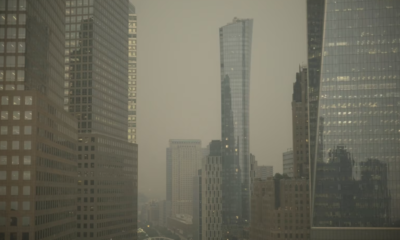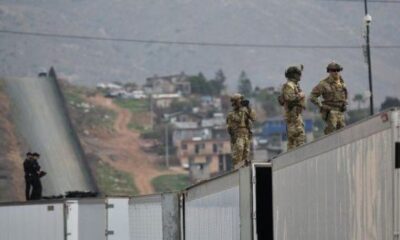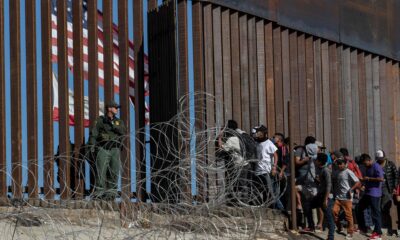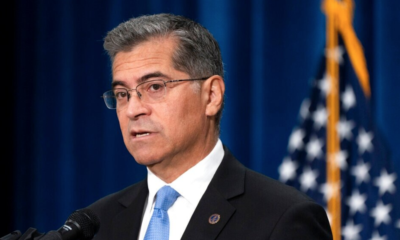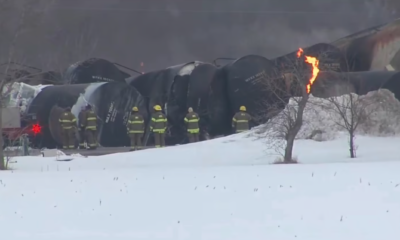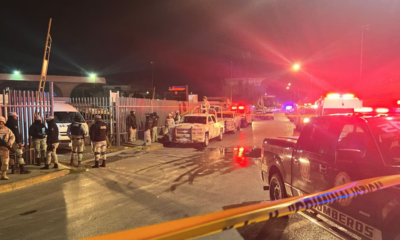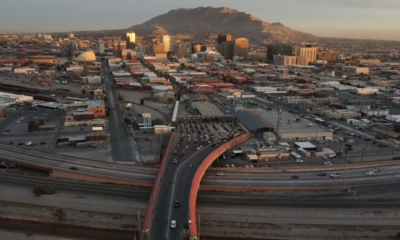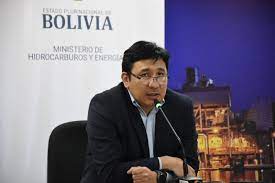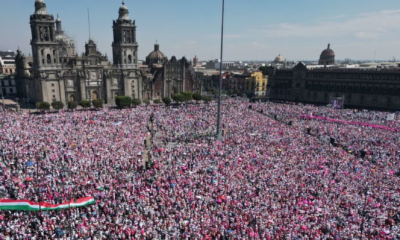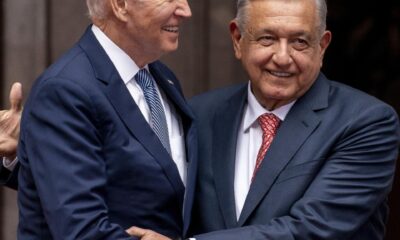International
Arizona to remove shipping container wall on US-Mexico border
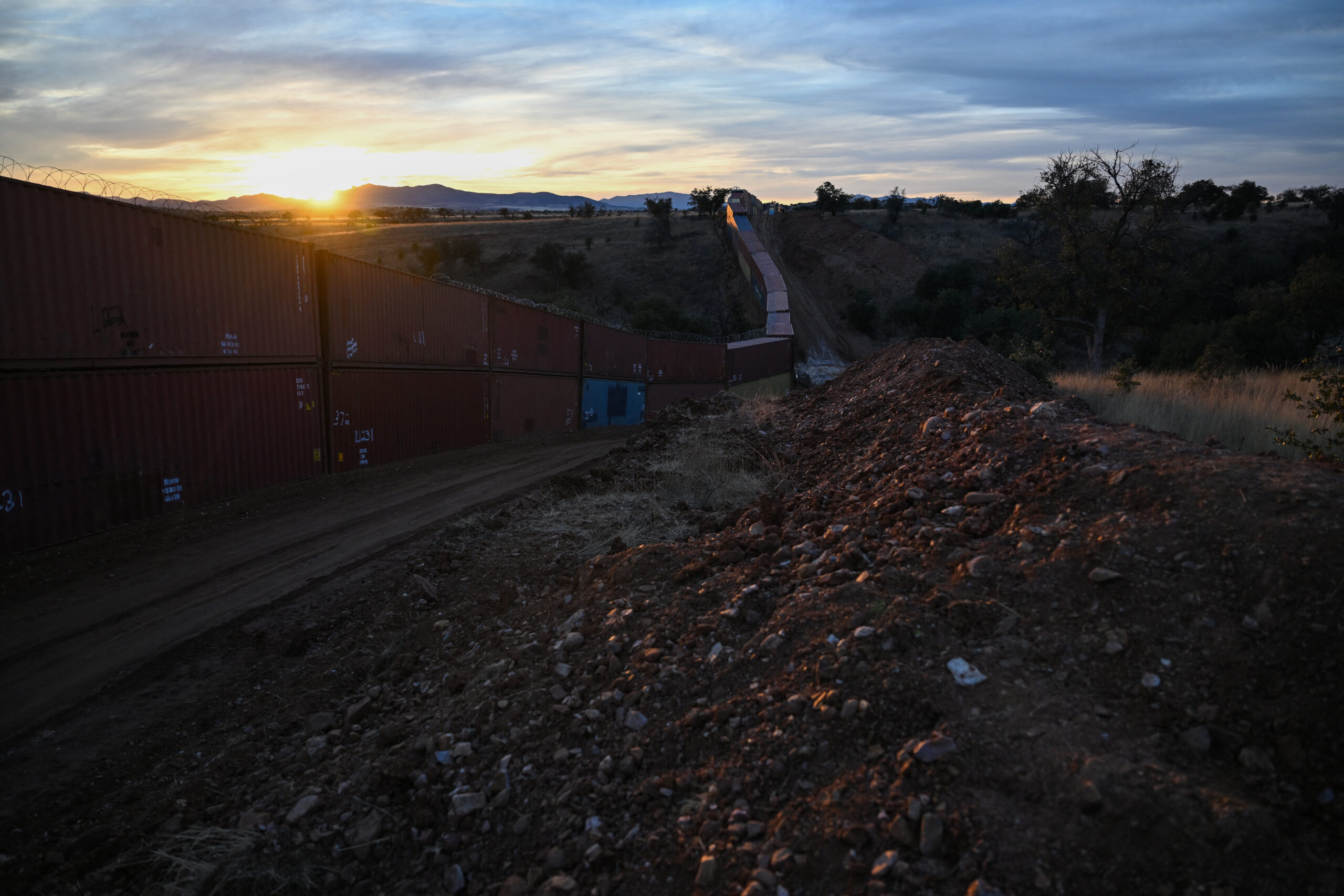
| By AFP | Paula Ramon |
Arizona agreed Wednesday to dismantle a wall of shipping containers at the Mexican border that critics said was an expensive, ecologically damaging political stunt that did nothing to keep migrants out of the United States.
The state’s Republican Governor Doug Ducey spent $90 million of taxpayers’ money lining up rusting boxes in what he said was a bid to stem the flow of people crossing into the country.
The corrugated containers, which snake for four miles (seven kilometers) through federal lands like a huge stationary cargo train, divide an important conservation area that is home to vulnerable species, but which is so difficult to traverse that people traffickers routinely avoid it.
Now Ducey, who leaves office early next year, will have to get rid of the 915 containers from the Coronado National Forest.
In an agreement reached Wednesday with the federal government, Ducey’s administration said it will “remove all previously installed shipping containers and associated equipment, materials, vehicles, and other objects from the United States’ properties on National Forest System lands within the Coronado National Forest.”
Biodiversity
From close up, the double-stacked container wall looks like the clumsy handiwork of a giant playing with building blocks.
Its presence is so jarring that, in addition to the federal court case, it was also the subject of two lawsuits by the Center for Biological Diversity, an environmental organization that has been active in the area for three decades.
“The biodiversity of this region is off the charts,” Russ McSpadden, a member of the organization, told AFP.
“It’s one of the most important conservation areas in the entire United States.”
Arizona shares around 370 miles (600 kilometers) of border with Mexico, including environmental preservation areas, national parks, military zones, and indigenous reservations.
Until the 2017 arrival in the White House of Donald Trump — who was propelled to power on his pledge to “Build That Wall” — there was very little in the way of a physical barrier separating it from Mexico.
Now vast stretches of the border have a fence that towers up to nine meters high.
Before the containers arrived in the Coronado National Forest — an area that can only be reached by dirt roads — the border here was demarcated by a wire fence.
That meager barrier was more than equal to the task of keeping people at bay, says McSpadden, whose cameras have picked up jaguars, and who has worked with teams collecting data on ocelots.
“I’ve never captured migrant traffic on any of the remote cameras,” he said.
“It’s an incredibly wild valley. There’s no real urban population anywhere nearby. It’s a very difficult part of the border for migrants to cross.”
And even if this were a heavily trafficked route, a casual observer can see that the shipping containers would not be very effective.
In several places that AFP visited, the boxes do not line up because of the uneven terrain, leaving gaps easily large enough for a person to walk through.
Others have holes rusted in them, and in some spots, it appears to have been impossible for workers to find a place stable enough to put a container.
A viral video shows a determined climber scaling the six-meter-high barrier in a matter of seconds, gaining easy purchase on the textured box walls.
But what the shipping containers do block is a waterway and the migration routes of the animals McSpadden studies.
“Jaguars know no borders,” he says.
“Southern Arizona, northern Mexico, it’s the same for them.”
With males known to range hundreds of miles, it’s easy for animals that came north to hunt to get trapped away from breeding populations south of the border.
“Jaguars want to move back and forth freely,” he says.
“This is their range, and the border wall bisects the jaguars’ home.”
International
Claudia Sheinbaum: Operation Against ‘El Mencho’ Was Based on Pending Arrest Warrants

Mexico’s President Claudia Sheinbaum on Wednesday rejected claims that the military operation that resulted in the death of Nemesio Oseguera Cervantes, known as “El Mencho,” leader of the Jalisco New Generation Cartel (CJNG), was carried out under pressure from the United States government.
Sheinbaum explained that the deployment of federal forces was aimed at executing outstanding arrest warrants against Oseguera Cervantes, who was considered one of the most wanted criminals in both Mexico and the United States.
“That was not the objective (to ease pressure from the United States). It is very important, and I want to repeat it. This individual had an arrest warrant, or several,” Sheinbaum said, referring to the operation conducted on February 22.
According to the president, the initial goal was to capture Oseguera Cervantes, but military forces responded after coming under attack during the intervention.
“The operation was to detain him. The problem is that they were attacked — the Secretariat of National Defense — and they responded at that moment,” she said.
The president insisted that the action was not carried out in response to external demands, although she acknowledged intelligence cooperation with the United States.
“It was not done in any way because of pressure from the United States, not at all. Of course, there was intelligence information from the United States that was used specifically,” she concluded.
International
Spain Denies Any Agreement to Cooperate with U.S. Military in Iran Operations
International
White House Says Spain Agrees to Cooperate with U.S. Military After Trump Threatens Trade Embargo

White House Press Secretary Karoline Leavitt said Wednesday that Spain has agreed “in recent hours” to cooperate with the U.S. military, following President Donald Trump’s threat to impose a trade embargo on Madrid.
Trump had warned of potential commercial measures after Spain reportedly refused to allow the Pentagon to use facilities at Spanish military bases for operations related to Iran.
“With respect to Spain, I think you heard the president’s message yesterday loud and clear, and I understand that in recent hours they have agreed to cooperate with the United States military,” Leavitt said during a press briefing.
She added that the U.S. military is currently coordinating with its counterparts in Spain. However, the president expects broader support.
“The president expects that all of Europe, all of our European allies, of course, will cooperate in this important mission — not only for the United States, but also for Europe,” Leavitt said.
Her remarks came in response to questions about Spain’s position and its role as a U.S. ally amid rising tensions surrounding operations involving Iran.
-

 International4 days ago
International4 days agoIran Reports 201 Dead, 747 Injured After U.S. and Israeli Strikes
-

 International3 days ago
International3 days agoBrazil’s Supreme Court Rejects Bolsonaro’s Bid for House Arrest
-

 International3 days ago
International3 days agoAnti-ICE Billboard Campaign Targets Immigration Spending in 31 U.S. Cities
-

 International2 days ago
International2 days agoSpain’s Prime Minister to Address Nation Amid Trump’s Trade Threats
-

 International4 days ago
International4 days agoPope Leo XIV Urges End to ‘Spiral of Violence’ in Middle East
-

 Sin categoría5 days ago
Sin categoría5 days agoTrump: ‘We Think It’s True’ Amid Claims Iran’s Supreme Leader Was Killed
-

 International5 days ago
International5 days agoSecurity Council to Hold Emergency Meeting on Middle East Crisis
-

 International3 days ago
International3 days agoTrump Warns of ‘Major Wave’ of Attacks as Iran Conflict Escalates
-

 International21 hours ago
International21 hours agoWhite House Says Spain Agrees to Cooperate with U.S. Military After Trump Threatens Trade Embargo
-

 International3 days ago
International3 days agoMexico Calls for Immediate Probe After National Dies in ICE Custody
-

 International2 days ago
International2 days agoNew York Announces First 2,000 Seats in Universal 2-K Program
-

 International21 hours ago
International21 hours agoSpain Denies Any Agreement to Cooperate with U.S. Military in Iran Operations
-

 Central America20 hours ago
Central America20 hours agoNicaragua Held Responsible for Harassment of Opposition Prosecutor and His Family
-

 International3 days ago
International3 days agoBolivia Orders Three Investigations Into Deadly Military Plane Crash
-

 International2 days ago
International2 days agoWarner Bros. Developing First ‘Game of Thrones’ Movie With ‘Andor’ Writer
-

 Central America3 days ago
Central America3 days agoPanama Canal Monitoring Trade as Middle East Conflict Disrupts Shipping
-

 Central America2 days ago
Central America2 days agoGuatemala’s Attorney General Fails in Bid for Top Court Seat Amid Corruption Allegations
-

 International20 hours ago
International20 hours agoClaudia Sheinbaum: Operation Against ‘El Mencho’ Was Based on Pending Arrest Warrants





























